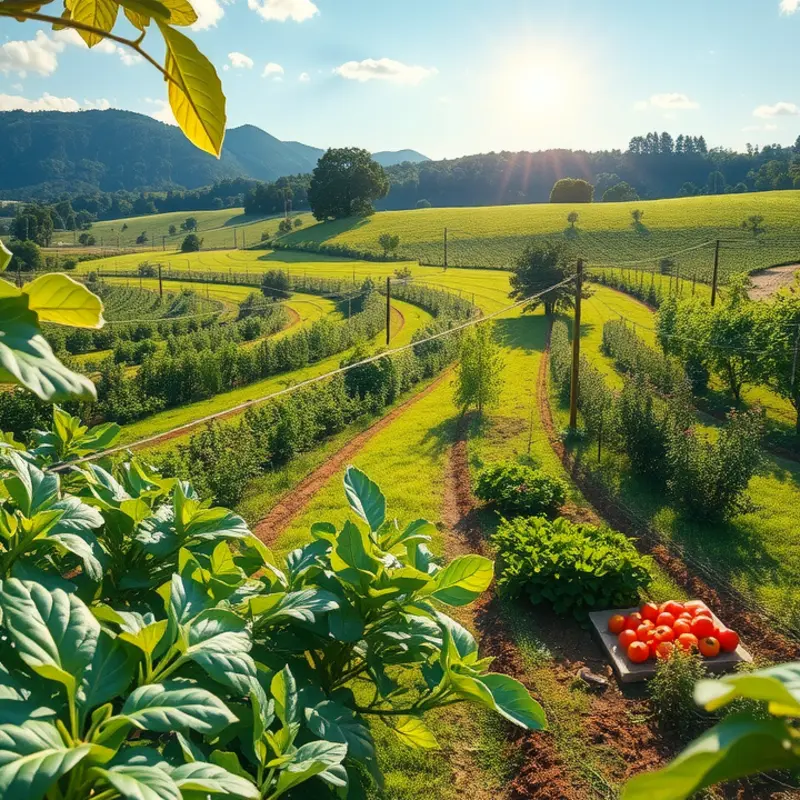Embracing ethical eating habits can significantly impact our planet’s health. By making conscious food choices, we can support sustainable farming practices and minimize environmental harm. This guide offers practical suggestions to help eco-conscious individuals cultivate a more sustainable diet. From choosing local produce to reducing food waste, these strategies empower you to be a part of the solution for a healthier planet.
Choosing Local and Seasonal Produce

Embracing local and seasonal produce can significantly lessen your carbon footprint. Transportation of food across long distances contributes greatly to greenhouse gas emissions. By opting for local produce, you’re reducing the distance food travels from farm to table. This choice not only cuts emissions but also ensures fresher food on your plate. Freshness translates to better nutritional value and taste, making your meals healthier and more enjoyable.
Supporting local economies is another compelling reason to buy local and seasonal produce. Small-scale farmers benefit directly from your patronage, enabling them to sustain their operations and contribute to regional food security. The economic cycle generated by local purchases encourages job creation and retention within the community. This boost in local economic activity ensures a vibrant and resilient food system.
Biodiversity thrives with local and seasonal eating habits. Farmers may grow a more diverse array of crops to accommodate changing seasons. This practice stands in contrast to monocropping, which depletes soil nutrients and threatens biodiversity. By purchasing a variety of local produce, you are encouraging sustainable farming practices that foster a healthier ecosystem.
Understanding farming practices is vital to making ethical food choices. Methods such as crop rotation and organic farming sustain soil health and reduce chemical use, thereby nurturing the environment and the health of consumers. As you explore local options, inquire about these practices. Direct interaction with farmers at markets can provide insights into their methods and values.
To incorporate local and seasonal produce into your routine, follow some practical steps. Locate nearby farmers’ markets, which serve as a conduit to fresh, local foods. Community-supported agriculture programs are another excellent option, offering seasonal produce subscriptions directly from farmers. For additional guidance, consider using seasonal eating calendars that outline when fruits and vegetables are at their peak in your area.
If you enjoy cooking, adapting recipes based on seasonal ingredients can be an exciting challenge. This proactive approach might even lead you to discover new flavors and ingredients. To get started with low-waste cooking that pairs well with local sourcing, check out this guide on low-waste cooking and prep.
Integrating local and seasonal produce into your life advocates for the environment, economy, and your health. Each mindful choice can contribute to a sustainable future, making every meal a step toward responsible consumption. As you deepen your connection with local foods, you help cultivate a more sustainable and ethical food system for future generations.
Reducing Food Waste: Practical Steps

Food waste significantly contributes to climate change through the release of methane, a potent greenhouse gas, from decomposing food in landfills. Moreover, the resources used in food production, such as water and energy, are wasted alongside it. Thus, minimizing food waste is both an ethical and environmental priority.
One effective strategy to reduce food waste is thoughtful meal planning. By preparing a weekly menu, you can buy only the ingredients you need, minimizing the chance of food going uneaten. Try to include versatile ingredients that can be used in multiple dishes. For example, vegetables used for a stir-fry can later complement a soup. Use a shopping list to guard against impulse buys that might end up forgotten.
Proper storage is another crucial step in minimizing waste. Different foods have varying storage requirements to maximize freshness. For produce, consider placing items like apples and carrots in the fridge, while root vegetables like potatoes prefer a cool, dark place. For precise storage tips, see Eco-Smart Kitchen Storage. Organize your fridge using a ‘first in, first out’ system, ensuring older items remain visible.
Utilizing leftovers requires creativity but can be incredibly rewarding. Transforming yesterday’s dinner into today’s lunch is not only cost-effective but also reduces your environmental footprint. Soups, stews, and casseroles are excellent ways to repurpose leftovers. Additionally, consider preserving excess produce by pickling, fermenting, or freezing, which extends its usability.
Finally, embrace a mindset of resourcefulness. Before discarding an item, ask yourself if it can be repurposed. Overripe bananas can become a delicious bread, and cheese rinds can add depth to broths. By cultivating such habits, you empower yourself to make a tangible difference in reducing food waste. These steps not only promote ethical eating but also foster a sustainable lifestyle.
By carefully planning meals, optimizing storage, and creatively using leftovers, we can all contribute to a significant reduction in food waste and its environmental impact.
Final words
Adopting ethical eating habits is not merely a personal choice; it is a powerful way to impact the environment positively. By choosing local and seasonal produce, you support sustainable farming and reduce your carbon footprint. Furthermore, reducing food waste not only saves money but also preserves precious resources. Every small action contributes to a larger movement toward a healthier planet. As you embark on this journey, know that your choices matter and can inspire others to join in the effort. Remember, ethical eating is a path towards sustainability, and every conscientious decision counts.








